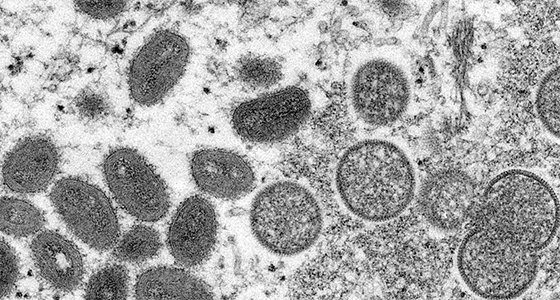
Electron micrograph of monkeypox virus particles isolated in 2003 in the United States from human samples (left, mature, oval viruses; right, immature, round viruses). Cynthia S. Goldsmith, Russell Regner / CDC / AP
-
Monkeypox is a rare viral infection, that does not normally spread easily between people. It requires very close skin-to-skin contact through broken skin; the eyes, nose or mouth; and direct contact with the lesions, bodily fluids or respiratory droplets of people who already have monkeypox. It can also be contracted through prolonged contact with the clothing, bedding and towels of people who already have the virus. Monkeypox may be passed on during sex.
-
A person with monkeypox will usually show symptoms from around 7 to 14 days after contact with someone already with the virus. Sometimes, this is can be as short as a few days to 21 days.
-
Most people are not at risk of monkeypox. People at highest risk are men who have sex with men, particularly those who are travelling to outbreak areas, have multiple sexual partners or attend large parties or sex on premises venues.
-
Ways to prevent monkeypox, is to avoid close contact with people who have monkeypox, or avoid contact with any rashes or sores and minimise skin-to-skin contact. Vaccination is one way to prevent monkeypox infection. Washing your hands thoroughly often, using soap and water or alcohol based sanisiter.
-
If you have returned to Australia from known outbreak hotspots such as Europe and North America, monitor for signs or symptoms of monkeypox, particularly if you have attended dance parties, sex parties, saunas, or sex on premises venues. If you feel unwell or sick, or have any rashes or sores, self-isolate immediately and call your local GP or sexual health clinic to make an appointment.
-
The most common symptom is a rash that develops from vesicles into blisters. Normally, these are rashes, or pimple-like lesions or sores, particularly in areas that are hard to see such as the genitals, anus or buttocks. These can be on the face, arms and legs. Symptoms can also show up as ulcers, lesions or sores in the mouth. People can experience fever, headache, muscle aches, backache, swollen lymph nodes, chills and/or exhaustion prior to the rash or lesions developing.
-
Monkeypox illness typically lasts for 2−4 weeks and is mild. Most people with monkeypox only need regular over-the-counter pain medicines and oral fluids and can be monitored by their GP or treating clinician. In some people, it can be more severe, especially people with a CD4 count below 200 cells/µL. A few people may need supportive management such as intravenous fluids and treatment to control fever or pain.
-
NSW Health have begun offer vaccination to people at highest risk from monkeypox. NSW Health expects to receive up to 30,000 doses at the end of September and 70,000 doses in early 2023.
-
If you have questions about monkeypox, contact the NSW Sexual Health Infolink on 1800 451 624.
-
- Australian Government Frequently Asked Questions
- For further information please call NSW Sexual Health Infolink on 1800 451 624.
Positive Life NSW will continue to monitor the situation
and provide updates to our community.
Last updated: Thursday 25 August 2022







